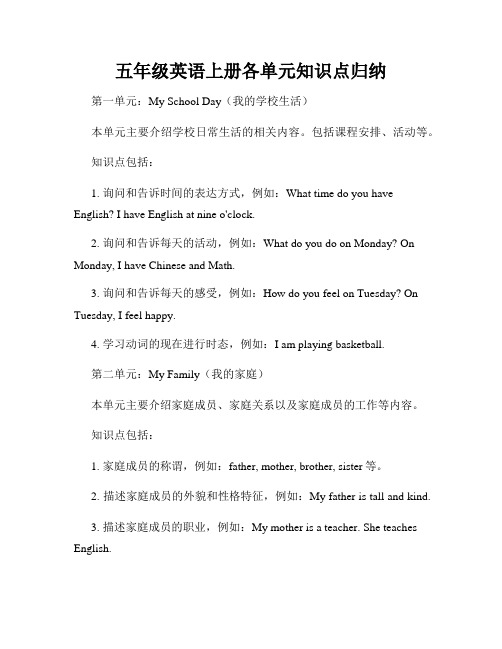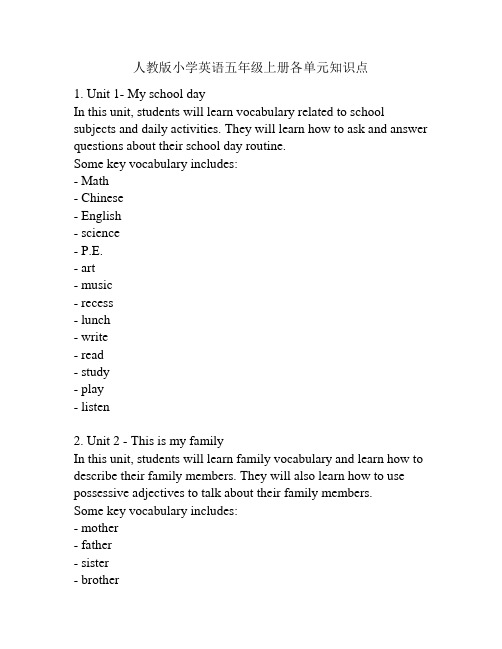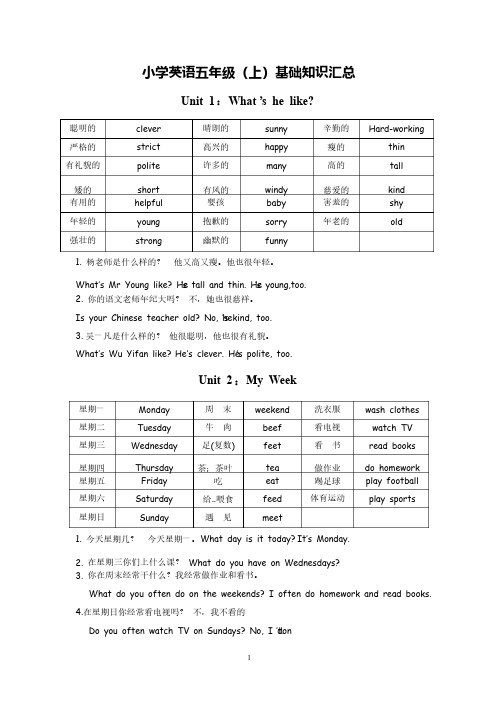五年级上册英语课本各单元知识点
五年级英语上册各单元知识点归纳

五年级英语上册各单元知识点归纳第一单元:My School Day(我的学校生活)本单元主要介绍学校日常生活的相关内容。
包括课程安排、活动等。
知识点包括:1. 询问和告诉时间的表达方式,例如:What time do you have English? I have English at nine o'clock.2. 询问和告诉每天的活动,例如:What do you do on Monday? On Monday, I have Chinese and Math.3. 询问和告诉每天的感受,例如:How do you feel on Tuesday? On Tuesday, I feel happy.4. 学习动词的现在进行时态,例如:I am playing basketball.第二单元:My Family(我的家庭)本单元主要介绍家庭成员、家庭关系以及家庭成员的工作等内容。
知识点包括:1. 家庭成员的称谓,例如:father, mother, brother, sister等。
2. 描述家庭成员的外貌和性格特征,例如:My father is tall and kind.3. 描述家庭成员的职业,例如:My mother is a teacher. She teaches English.4. 学习问句和回答关于家庭成员的问题,例如:Who is this? This is my sister.5. 学习形容词性物主代词,例如:his, her, their等。
第三单元:My Friends(我的朋友)本单元主要介绍朋友的特点、爱好以及朋友之间的互动等内容。
知识点包括:1. 描述朋友的外貌特征和性格特点,例如:He is tall and funny.2. 描述朋友的爱好,例如:He likes playing football.3. 学习问句和回答关于朋友的问题,例如:What does he like? He likes drawing.4. 学习形容词比较级,例如:He is taller than me.第四单元:At the Park(在公园)本单元主要介绍公园中的景物、活动以及人们的感受等内容。
英语五年级上册各单元基础知识(带答案)

英语五年级上册各单元基础知识(带答案)五年级英语上册词汇、句子归纳总结unit1whichdoyoulikebetter?词汇:鸡肉chicken鱼肉fish三明治sandwiches汉堡_hamburgers甜甜圈donuts杯型蛋糕cupcakes奶昔milkshake苹果汁applejuice肉meat超市supermarket付款pay英语english语文chinese科学science书法calligraphy体育pe美术art数学maths音乐music学科subject困难的difficult画drawing读书reading养鸟keepbirds种花growflowers扔沙包throwbeanbags跳绳jumprope绵羊sheep熊bear分钟minute写上,放puton句子:1.小鸡鱼,你喜欢哪种鱼?你喜欢哪一种,鸡肉还是鱼?我更喜欢鱼我更喜欢鱼2。
你最喜欢哪门课?你最喜欢哪门课?ilike__chinese___best.idobestin_chinese_______.我最喜欢语文,我语文学的最好。
3.ilike___reading____,butilike_drawing____better.___我喜欢读书,但是我更喜欢画画。
词汇:sorry.ineedtofinishmyhomeworkfirst.抱歉,我要先完成我的作业。
3.thebikeisbroken.shallwefixitthisafternoon?自行车坏了,下午我们一起修一下好吗?yes,let’s.好的,我们一起修吧。
第三单元中秋节还有什么值得纪念的吗?词汇:中秋节themid-autumnfestival重阳节thedoubleninthfestival元宵节thelanternfestival端午节thedragonboatfestival春节thespringfestival农历thechinesecalendar万圣节halloween感恩节thanksgiving复活节easter圣诞节christmas短语:全家人聚在一起吃月饼和水果享受满月爬山探望爷爷看望客人穿好衣服敲门敲门说“不给糖就捣蛋”寻找复活节彩蛋有窝蛋句子:1.whenisthemid-autumnfestival/thedoubleninthfestival?中秋节/重阳节在什么时候?这是中国日历上的第十五天。
人教版小学英语五年级上册各单元知识点

人教版小学英语五年级上册各单元知识点1. Unit 1- My school dayIn this unit, students will learn vocabulary related to school subjects and daily activities. They will learn how to ask and answer questions about their school day routine.Some key vocabulary includes:- Math- Chinese- English- science- P.E.- art- music- recess- lunch- write- read- study- play- listen2. Unit 2 - This is my familyIn this unit, students will learn family vocabulary and learn how to describe their family members. They will also learn how to use possessive adjectives to talk about their family members.Some key vocabulary includes:- mother- father- sister- brother- grandmother- grandfather- aunt- uncle- cousin- daughter- son- possessive adjectives (my, your, his, her)3. Unit 3 - At the zooIn this unit, students will learn vocabulary related to animals and their habitats. They will also learn how to talk about what animals can do (i.e. run, swim, fly, etc.).Some key vocabulary includes:- lion- tiger- elephant- giraffe- monkey- panda- kangaroo- penguin- habitat (forest, desert, ocean, etc.)- can/can't4. Unit 4 - My homeIn this unit, students will learn vocabulary related to the rooms in a house and furniture. They will also learn how to use prepositions to describe where things are in a room.Some key vocabulary includes:- living room- kitchen- bedroom- bathroom- dining room- sofa- table- chair- bed- closet- prepositions (on, under, next to)5. Unit 5 - My scheduleIn this unit, students will learn how to talk about their daily schedules and activities. They will also learn vocabulary related to time and daily routines.Some key vocabulary includes:- wake up- brush teeth- take a shower- go to school- come home- eat dinner- do homework- bed time- time (hour, minute, second)6. Unit 6 - My hobbiesIn this unit, students will learn how to talk about their hobbies and interests. They will also learn vocabulary related to differenthobbies and sports.Some key vocabulary includes:- play soccer- dance- sing- draw- swim- ride a bike- play the piano- watch TV- read books- hobby- interest7. Unit 7 - Our worldIn this unit, students will learn vocabulary related to different countries and cultures. They will also learn how to ask and answer questions about different places in the world.Some key vocabulary includes:- country- flag- language- symbol- landmark- continent- questions (What's the capital of...? What language do they speak in...?)8. Unit 8 - Let's celebrate!In this unit, students will learn vocabulary related to holidays andcelebrations. They will also learn about different traditions and customs around the world.Some key vocabulary includes:- Halloween- Thanksgiving- Christmas- New Year's Day- Valentine's Day- Easter- tradition- custom- celebrateOverall, these units will help students develop their language skills in various areas such as vocabulary acquisition, grammar usage, and communication. By the end of the fifth grade, students will have a foundation of English language that will prepare them for more complex language use in the future.In addition to the vocabulary and grammar covered in these eight units, there are also important language skills that students will develop, such as reading comprehension and writing ability. Throughout the units, students will be completing various reading activities to help them understand and contextualize the new vocabulary and grammar they are learning. They will also be practicing writing skills, such as paragraph writing and short answer responses.Reading comprehension is a vital skill for English language learners, as it helps students to understand and interpret new information. In each unit, there will be reading passages related to that unit's topic. For example, in Unit 3, students may read aboutdifferent animal habitats and learn how animals adapt to their environment. Reading comprehension activities may include reading comprehension questions, matching exercises, and writing exercises. By the end of each unit, students should have a solid understanding of the reading material and be able to answer questions related to the content.Writing is another essential skill that students will develop throughout these units. Writing exercises will be incorporated into each unit, helping students to practice writing in English and apply the new vocabulary and grammar they are learning. Some writing exercises may include writing short paragraphs about their hobbies or describing their family members. By the end of the fifth grade, students should be able to write coherent paragraphs with proper grammar, spelling, and punctuation.Speaking and listening skills will also be developed through group and partner activities in each unit. Students will be encouraged to ask and answer questions in English, and engage in conversations with their peers. They will also have opportunities to give short presentations on topics related to each unit, which will help them develop their public speaking skills.Overall, these eight units are designed to provide a comprehensive language learning experience for students in fifth grade. By the end of the program, students should be able to understand and use everyday English vocabulary and grammar in a variety of contexts. They should also be able to read and comprehend short passages, write short paragraphs independently, and engage in conversations and presentations with their peers. It is important to note thatlanguage learning is a gradual process, and students will vary in their language proficiency at the end of the program. However, with consistent practice and dedication, students in fifth grade will be well-prepared for more advanced language learning in the future.。
五年级上册英语单元重点表格

五年级上册英语单元重点表格一、五年级上册英语单元重点概述五年级上册英语单元重点涵盖了日常交际用语、词汇、语法和句型等方面。
本篇文章将对各单元的核心知识点进行梳理,以帮助同学们更好地掌握和运用所学内容。
二、各单元核心词汇与语法梳理1.Unit 1:重点词汇与语法- 词汇:动物、颜色、水果等- 语法:一般现在时、一般疑问句和回答、祈使句2.Unit 2:重点词汇与语法- 词汇:身体部位、日常活动、天气等- 语法:一般现在时、一般疑问句和回答、祈使句3.Unit 3:重点词汇与语法- 词汇:食物、衣物、地点等- 语法:一般现在时、一般疑问句和回答、祈使句4.Unit 4:重点词汇与语法- 词汇:家庭成员、职业、性格等- 语法:一般现在时、一般疑问句和回答、祈使句5.Unit 5:重点词汇与语法- 词汇:交通工具、时间、地点等- 语法:一般现在时、一般疑问句和回答、祈使句三、实用学习策略与建议1.制定学习计划:合理安排学习时间,确保每个单元的学习内容都能得到充分的复习。
2.创造语言环境:与同学、老师用英语进行日常交流,提高口语表达能力。
3.制作单词卡片:将重点词汇制作成卡片,便于随时查阅和记忆。
4.开展合作学习:分组进行听说读写练习,相互纠正错误,共同提高。
5.定期自测:通过单元测试、模拟题等形式,检验学习效果,找出薄弱环节。
四、复习与提高练习1.复习资料:利用课本、课堂笔记、单词卡片等进行复习。
2.提高练习:做一些课后习题、模拟题、听力练习等。
3.参加课外活动:参加英语角、英语剧社等,丰富英语学习体验。
通过以上梳理和实用建议,希望能帮助同学们更好地掌握五年级上册英语单元重点,提高英语水平。
人教版五年级英语上册知识点汇总

精品基础教育教学资料,仅供参考,需要可下载使用!人教版五年级英语上册知识点汇总第一单元需要掌握的单词:young年轻的funny滑稽可笑的tall高的strong强壮的kind和蔼的old年老的short矮的thin瘦的Mr先生like像;喜欢strict严格的smart聪明的;巧妙的active积极的;活跃的quiet安静的;very很;非常but但是缩写形式:who’s=who is what’s=what is he’s=he is she’s=she is重要句型:1.Who’s your art teacher?你们的美术老师是谁?----Mr Hu.胡先生.2.What’s he like?他长得什么样子? ----He’s short and thin.他又矮又瘦3.Is she young?她年轻吗?----Yes,she is/No, she isn’t.以前的知识:I have a new math teacher.我有一个新数学老师.(小学三年级已经学过I havea pen.)注意: 划线部分可以替换.第二单元:四会单词:Monday 星期一 Tuesday星期二Wednesday星期三 Thursday星期四Friday 星期五Saturday星期六Sunday 星期日day天;日子have有;吃on 在……时候too也;太短语:do homework 做作业watch TV 看电视read books 读书What about? ......怎么样?do housework 做家务play computer games 玩电脑游戏重点句型:1.What day is it today?今天星期几?—It’s Monday.星期一.2. What do we have on Mondays?星期一我们有什么课?—We have English,science,computer and P.E.我们有英语课,科学,计算机跟体育课.3.What do you do on Saturdays?星期六你干什么?(具体的某一天前用介词on,在具体的时间前,用介词at)—I often do my homework.我通常做家庭作业.4.What about you?你呢?—I do my homework,too.我也是做家庭作业.第三单元:四会单词:eggplant 茄子fish 鱼green beans 青豆tofu 豆腐potato 土豆tomato 西红柿for 为;给lunch 中餐;午饭we 我们tasty 好吃的;可口的sweet 甜的sour 酸的fresh 新鲜的salty 咸的favourite 最喜爱的;特别喜爱的fruit 水果grape 葡萄缩写形式:they’re=they are don’t=do not重点句型:1.What would you like for lunch?你午餐想吃什么?-----I’d like some tomatoes and mutton.我想吃一些西红柿跟羊肉.2.What’s your favourite fruit?你最喜欢的水果是什么?------/I like apples.我喜欢苹果.3.I don’t like grapes.我不喜欢葡萄.4.Bananas are my favourite.我最喜欢香蕉.第四单元一. 单词:empty the trash倒垃圾cook the meals 做饭water the flowers浇花sweep the floor扫地clean the bedroom打扫卧室make the bed铺床set the table摆餐具wash the clothes洗衣服do the dishes洗碗碟put away the clothes收拾衣服can’t = cannot(不会;不能)use a computer(使用计算机)二. 句子:1. I’m helpful! I can sweep the floor。
人教精通版五年级英语上册各单元知识点汇总

人教精通版五年级英语上册各单元知识点汇总Unit 1 We have new friends.单元知识必备清单重点词汇hello 喂;嗨(招呼用语)am 是I’m=I amwhere 哪里are 是you 你;你们from 从what 什么is 是your 你的;你们的name 名字what’s=what is Britain 英国Australia 澳大利亚New Zealand 新西兰France 法国Germany 德国Russia 俄罗斯city 城市road 道路street 街道重点短语come here 到这里来come from 来自welcome to... 欢迎来到……重点句型1. I’m Bob. I’m eleven. 我是鲍勃。
我11 岁。
解读:在向别人进行自我介绍时,常用“I’m...”句型表示“我是……”。
该句型主要用于介绍自己的名字、年龄、身材等。
2. —Where are you from? 你来自哪里?—I’m from France. 我来自法国。
解读:问句是由where 引导的特殊疑问句,用来询问某人来自哪里。
句型结构:—Where + be 动词+ 主语+ from? —主语+ be动词+ from + 地点名词。
同义句:—Where do you come from? 你来自哪里?—I come from Germany. 我来自德国。
本句也是询问某人来自哪里,句中有实义动词come, 因此必须借助助动词do 的相应形式来构成问句。
3.—What’s your name?你的名字是什么?—My name is Cathy.我的名字是凯茜。
解读:本句用来询问对方的姓名。
what’s 是what is 的缩写形式。
my 和your 是形容词性物主代词。
句型结构::—What’s your name? —My name is + 名字/ I’m + 名字.4. —Where do you live, Cathy?你住在哪里,凯茜?—I live in the Happy City. 我住在幸福城。
最新人教精通版小学英语五年级上册单元知识点总结(全册)

Unit 1 Wehavenewfriends.一、核心词汇hello 喂;嗨(招呼用语) hi 喂;嗨(招呼用语) I 我 you 你;你们 your 你的;你们的 am 是 is 是 are 是 I'm=Iam what's=whatis where 哪里 what 什么 from 从 name 名字二、拓展词汇Britain 英国 Australia 澳大利亚 NewZealand 新西兰 France 法国 Germany 德国Russia 俄罗斯 city 城市 road 道路 street 街道三、核心句型1.I'mBob.I'meleven.IcomefromBritain. 我是鲍勃。
我 11 岁了。
我来自英国。
解读 :这是作自我介绍的最普通的一组句子,介绍自己的名字、年龄和出处。
举一反三 :I'mBen.I'mten.IcomefromBritain. 我是本。
我 10 岁了。
我来自英国。
2.— Whereareyoufrom? 你来自哪里 ?— I'mfromChina. 我来自中国。
解读 :这是用来询问对方来自哪里的句子。
举一反三 : — Whereareyoufrom? 你来自哪里 ?— I'mfromFrance. 我来自法国。
3.— Wheredoyoucomefrom? 你来自哪里 ?— IcomefromNewZealand. 我来自新西兰。
解读 :这也是用来询问对方来自哪里的句子。
举一反三 : — Wheredoyoucomefrom? 你来自哪里 ?— IcomefromChina. 我来自中国。
4.— What'syourname? 你的名字是什么 ?— MynameisCarl. 我的名字是卡尔。
解读 :此句是用来询问对方名字的句子。
举一反三 : — What'syourname? 你的名字是什么 ?— MynameisAmy. 我的名字是埃米。
五年级上册英语1-6单元基础知识汇总(附答案)

聪明的聪明的 clever 晴朗的晴朗的 sunny 辛勤的辛勤的 Hard-working严格的严格的 strict 高兴的高兴的 happy 瘦的瘦的 thin 有礼貌的有礼貌的 polite 许多的许多的 many 高的高的 tall 矮的矮的 short有风的有风的 windy慈爱的慈爱的 kind有用的有用的 helpful 婴孩婴孩 baby 害羞的害羞的 shy 年轻的年轻的 young 抱歉的抱歉的 sorry 年老的年老的old 强壮的强壮的strong幽默的幽默的funny星期一星期一 Monday 周 末 weekend 洗衣服洗衣服 wash clothes 星期二星期二 Tuesday 牛 肉 beef 看电视看电视 watch TV 星期三星期三 Wednesday 足(复数) feet 看 书 read books 星期四星期四 Thursday茶;茶叶茶;茶叶tea做作业做作业 do homework星期五星期五 Friday 吃 eat 踢足球踢足球 play football 星期六星期六 Saturday 给..喂食喂食 feed 体育运动体育运动play sports星期日星期日Sunday遇 见meetUnit 3:What would you like? 三明治三明治 sandwich es 下去下去 down 新鲜的新鲜的 fresh 沙拉沙拉 salad 慢慢的慢慢的 slow 甜的甜的 sweet 汉堡包汉堡包 hamburger雪;下雪雪;下雪 snow 辣的;热的辣的;热的 hot 茶 tea 黄色的黄色的 yellow 健康的健康的 healthy 冰激凌冰激凌 ice cream 窗户窗户 window 美味的美味的 delicious 牛肉牛肉 beef 怎样怎样 how 最喜欢的最喜欢的 favourite 花 flower 现在现在 now 食物食物 food 饮料饮料drink奶牛奶牛cow面条面条noodles1. 你想吃什么?你想吃什么?我想吃一些三明治和沙拉。
- 1、下载文档前请自行甄别文档内容的完整性,平台不提供额外的编辑、内容补充、找答案等附加服务。
- 2、"仅部分预览"的文档,不可在线预览部分如存在完整性等问题,可反馈申请退款(可完整预览的文档不适用该条件!)。
- 3、如文档侵犯您的权益,请联系客服反馈,我们会尽快为您处理(人工客服工作时间:9:00-18:30)。
Unit1 What he like
重点单词:
old Young funny kind strict polite hard-working helpful clever shy sometimes will know robot finish he‵s=he is who‵s=who is Mr. Miss Mrs
重点句子:
1、询问外貌特征及性格的句型?
What’s mike/she/he like?
A:Ms Wang will be our new Chinese teacher.
B:What’s she like?
A:She’s very kind?
2. 确认人性格外貌
A:Is she strict?
B:Yes,sometimes.
3、A:Do you know Mr Young?
B: No,I don’t (否定回答)
Yes,I do(肯定回答)。
3、A:Who is your math teacher?(询问谁?)
B:Mr Li
4、A:Is she strict?
B: Yes,she is.(肯定回答)No,she is not.(否定回答)
Unit2 My week
重点单词:
Monday Tuesday Wednesday Thursday Friday Saturday
Sunday weekend wash wash my clothes watch
watch TV do做do homework do housework read read books play play football often cooking tired sport should every schedule day
重点句子:
1、询问在周几有什么课。
What do you have on____?
A:What do you have on Fridays?
B:I have a PE class.
2、确认你经常做某项活动吗及答语
Do you often__活动_____?
Do you often play sports?
No, I don’t. I don’t like sports.
Yes,I do.
3、A: What do we have on Wednesdays ?
B: We have English 、science and computer on Wednesdays.
4、询问在周几(经常)做什么
What do you (often)do on———?
A: What do you (often)do on Wednesdays?
B: I often wash my clothes on Wednesdays.
5. What day is it today?
It’s _____.
6. Is it Monday ?
Unit3 What would you like
重点单词:
Sandwich salad hamburger ice cream tea fresh healthy delicious hot sweet drink thirsty favourite food Dear onion
重点句子:
1.询问你最喜欢的食物是什么?及答语
A: What’s your favourite food? (what’s=what is)
B: My favourite food is salad.
2、询问你喜欢吃什么?
A: What would you like to eat ?
B:I’d like some noodles.
3、询问你喜欢喝什么?
A: What would you like to drink ?
B: I’d like some water. I’m thirsty
4、My favorite food is ice cream .It is sweet. I don’t like beef but chicken is ok.
5、I like vegetables but not carrots.
Unit4 What can you do?
重点单词:
Sing song sing English songs play the pipa kung fu do Kung fu dance draw carton draw cartoons cook swim paly basketball play ping-pong speak English we’ll=we will party next wonderful learn any problem no problem want send Email at
重点句子:
1. 询问你能/会做什么?
A: What can you do for the party?
B: I can play pipa / sing English songs.
A:Wonderful
(What can 某人do?——某人can____)
2、确认会做某项活动?
A: Can you do any Kung fu?
B: Yes, I can.(肯定回答)是,的我能。
No, I can’t.(否定回答)不,我不能。
3、A: Are you helpful at home?
B:Sure.
Unit5 There is a big bed
重点单词:
clock plant bottle water bottle bike photo front in front of between above beside behind there lot lots of flower move dirty live nature everywhere
重点句子:
①表达有/存在.......的句型。
there is+单数
There are +复数
②some 只能用于肯定句,any用于否定和疑问句,many 可以用于肯定疑问与否定句
1、A:Is this your bed room?
B: :Yes, it is.
2、What’s in the room ?
There is a table beside the bed.
3、There is a bed 、a table and two computers。
4、A: Where is the chair? 椅子在哪里?
B: It is near the desk. 在课桌旁边。
5、There is a clock in my room.我的房间有一个时钟。
6、There are book s on the desk .课桌上有些书。
Unit 6 In a nature park
重点单词:forest river lake mountain hill tree bridge building village house boating go boating rabbit high grass
重点句子:
1、There is a big white bird in the sky.
There are many pretty fish in the river.
2、there is....../there are......句型变疑问,把is、are提前。
Is there+单数?Are there 复数......?
A: Is there a river in the park?
B: Yes, there is.(肯定回答) 是的,有。
No, there isn’t(否定回答)不,没有。
3、A: Are there any bridges in your village?
B: Yes, there are 是的,有些。
No, there aren’t.不,没有。
4、There are some trees near the road.。
